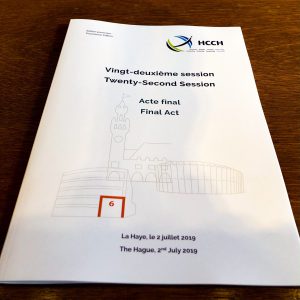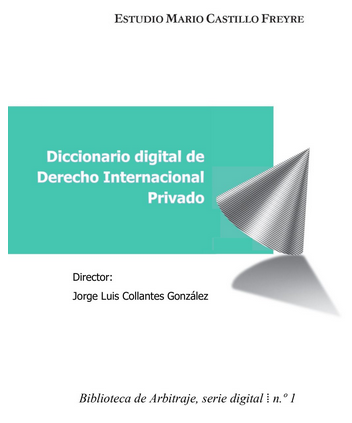Views
A Resurrection of Shevill? – AG Szpunar’s Opinion in Glawischnig-Piesczek v Facebook Ireland (C-18/18)
Written by Anna Bizer
Anna Bizer, doctoral candidate at the University of Freiburg, has kindly provided us with her thoughts on AG Szpunar’s opinion in the case of Glawischnig-Piesczek v Facebook Ireland (C-18/18).
Since the EP-proposal from 2012, the European Union has not shown any efforts to fill the gap still existing in the Rome II Regulation regarding violations of personality rights (Article 1(2)(g)). However, Advocate General Szpunar has just offered some thoughts on the issue in his opinion on the case of Eva Glawischnig-Piesczek v Facebook Ireland Limited (C-18/18) from 18 June 2019. Read more
Conclusion of the HCCH Judgments Convention: The objectives and architecture of the Judgments Convention, a brief overview of some key provisions, and what’s next?
Prepared by Cara North, external consultant to the Permanent Bureau of the Hague Conference on Private International Law (HCCH). This post reflects only personal views.
Today marks a momentous occasion (in the private international law world at least): the conclusion of the Diplomatic Session on the HCCH Convention on the Recognition and Enforcement of Foreign Judgments in Civil or Commercial Matters (“Judgments Convention”). A Convention that, as noted by the Secretary General of the Hague Conference on Private International Law (“HCCH”) during his opening remarks for the Session, will be a “gamechanger for cross-border dispute settlement and an apex stone for global efforts to improve real and effective access to justice.” Read more
DONE! An important day for global justice and the Hague Conference on Private International Law
Posted for the Permanent Bureau of the Hague Conference on Private International Law (HCCH)

Today, the delegates of the 22nd Diplomatic Session of the HCCH signed the Final Act of the 2019 Convention on the Recognition and Enforcement of Foreign Judgments in Civil or Commercial Matters – the birth of new treaty and an important day for global justice as well as for the HCCH.
The signing of the Final Act took place during a ceremony in the Great Hall of Justice in the Peace Palace in the presence of the Minister of Foreign Affairs of the Kingdom of the Netherlands, Mr Stef Blok.
The Minister emphasised that the new Convention: “enhances the legal certainty and predictability that is so important in international legal matters…”.
This new Convention will be essential to reducing transactional and litigation costs in cross-border dealings and to promoting international access to justice. It will increase certainty and predictability, promote the better management of transaction and litigation risks, and shorten timeframes for the recognition and enforcement of a judgement in other jurisdictions, providing better, more effective, and cheaper justice for individuals and businesses alike. A true gamechanger in international dispute resolution.
The Secretary General of the HCCH, Dr Christophe Bernasconi, stressed that the 2019 Judgments Convention fills an important gap in private international law. He also reminded delegates that with the signing of the Final Act, the work of promoting the 2019 Judgments Convention has only just begun. Professor Paul Vlas, President of the 22nd Diplomatic Session, echoed this sentiment and reiterated that the fast, wide and effective uptake of the Convention by the international community is its next milestone.
After the signing of the Final Act, Uruguay signed as first State the new 2019 Judgments Convention.
The text of the 2019 Judgments Convention, the HCCH’s 40th global instrument, will be available shortly on www.hcch.net.
News
New Article in Uniform Law Review
Today, the Uniform Law Review published a private international law article titled: CSA Okoli, “The Significance of a Forum Selection Agreement as an Indicator of the Implied Choice of Law in International Contracts: A Global Comparative Perspective”.
The abstract reads as follows:
Where the parties to an international contract fail to specify the choice of law, a forum selection agreement is one of the most, if not the most, significant factors to consider in implying the choice of law in many international, supranational, regional instruments, and national jurisdictions. However, it is an ill-defined, notoriously complex, and hotly debated issue as to the weight that should be attached to a forum selection agreement in implying the choice of law. Hence, this article is devoted to discussing this topic from a comparative perspective, in order to propose a guide to global uniform criteria. To achieve this, the article covers all relevant international, regional, and supranational instruments, and selected legal systems in Africa, Asia, Australasia, Europe, the Middle East, and North and South America. The legal systems compared include those from the global North and global South, including common law, civil law, and mixed legal systems. The article’s core proposal is that an exclusive forum selection agreement should be a key factor in implying the choice of law. However, except in such cases as where a forum is chosen on a neutral basis, there should be a general requirement of corroboration with at least one other factor of significance. The aim of the proposal is to contribute to greater uniformity, predictability, and certainty in the global community in this field of law.
August 2023 Update: List of China’s Cases on Recognition of Foreign Judgments
Written by Dr. Meng Yu and Dr. Guodong Du, co-founders of China Justice Observer*
On 20 August 2023, China Justice Observer released the 2023 version of List of China’s Cases on Recognition of Foreign Judgments. To date, we have collected 98 cases involving China and 25 foreign States and regions. (Note: Foreign divorce judgments are excluded in the Case List.)
Diccionario digital de Derecho Internacional Privado in open access
Diccionario digital de Derecho Internacional Privado contains no less than 1522 pages in the Spanish language dedicated to analysis of crucial notions in private international law. Each notion is explained in length and accompanies with bibliographic references.
This electronic publication is edited by Jorge Luis Collantes González and features contributions by many private international law authors. It may be downloaded free of charge here.



